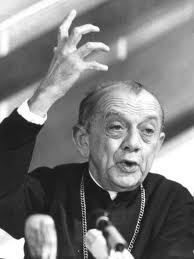I recently came across this excerpt from an interview, which first appeared in 1999. I am reminded of the 17 people who showed up on Sunday at Sophia House to hear Sara and Emily speak about another prophetic bishop of the people, Oscar Romero.
David Barsamian: The Brazilian archbishop Dom Hélder Camara once said, “When I fed the poor, they called me a saint. When I asked why are they poor, they called me a communist.” Did you know him?
Noam Chomsky: I didn’t know him, but about two years ago I happened to be in Recife, which was his base. He was one of the leading figures in liberation theology. He made a real difference in Brazil and in the world, and in particular in Recife. The church traditionally had been the church of the rich. He turned it into a church of the poor. He got his priests and nuns to work in the poor areas. Church buildings were given over to educational and health institutions. It made a big change. Recife was one of the leading centers of liberation theology. It was devastated, mainly by violence, but also by the Vatican.
The Vatican was strongly opposed to Dom Hélder Camara. The Vatican doesn’t have guns, but it had its own force. The Pope was able to undermine liberation theology, get rid of the progressive bishops, and put in very reactionary ones. The effect is that there is nothing left in Recife. Except for people roughly my age, people don’t even know about this history anymore. Liberation theology was dismantled.
There’s been a lot of commentary in the last couple of weeks about the Pope’s visit to Mexico. I’ve collected these articles, too. The standard one says that liberation theology is extinct. Now there is what they call “post-liberation theology.” There’s a question about just how liberation theology became extinct. Liberation theology was one of the reasons for the regime of terror and repression that spread over the continent, with national security states and state terror — always with U.S. backing. It was an awful period, a real plague in Latin America. The Vatican played its role.
Symbolic of that is the fact that the new archbishop in El Salvador is a right-wing Spanish priest who’s also a brigadier in the Salvadoran army. This is the army that murdered Archbishop Romero and the Jesuit intellectuals, along with a few other exploits. That’s symbolic, and they understand it. The new post-liberation theology is semi tolerable to elites. The tepid version that gets reported, and it’s not totally false, is that the post-liberation theology pleads with the rich to be nicer to the poor. The new idea is, you evangelize the rich so that they have a social conscience and they’ll drop some more crumbs down on the poor. They’ll accept their social responsibility. The bad kind of liberation theology, which has in some mysterious way become extinct, called on priests to do what Dom Hélder Camara was doing: organize base communities of poor people who might organize to take their fate into their own hands. That’s not right, according to the preferred morality. You’re supposed to at most plead with the ruler to be a benefactor.
If you want another example of that, take today’s article on the World Economic Forum in Davos, Switzerland, in the New York Times. It talks about how the rich have to have more of a sense of social responsibility. It’s not that poor people ought to organize and take what’s their right. Not that we should have a democratic society in which people organize and take over and make their own decisions. But we rich folk better be a little more benevolent. The proles might get out of hand. That’s post-liberation theology, or at least the version of it that reaches the press.
Actually, if you look at the Pope’s statements, it’s not quite like that. The Pope made a major speech on January 1, as he always does, and it was devoted to this issue. It received minimal coverage. The Washington Post had a report in which they didn’t comment on its content. The Times had a report in which the last sentence sort of hinted at its content. But the content was interesting. It described the major crimes of today, which are Marxism, fascism, and materialist consumption, on a par with the first two. Not only did it have the line that was allowed to seep through, pleading with the rich to be more benevolent. It also said that nations and peoples have the right to make the decisions that determine the nature of their own lives.
That somehow has disappeared. But that was the message of liberation theology, the kind that the Vatican tried to crush and that the United States much more dramatically did crush. And Dom Hélder Camara is an example. He wasn’t killed, but what he tried to do was killed.

Reblogged this on Kairos Southern Africa.
Liberation theology like black theology were natural outgrowths of the church to elite and oppressive vatican thinking. However it must not be underestimated that Romero and more recently in Brazil the PT was built by the grassroots Catholic faith. Pope John Paul 11 played asignificant role in supporting the end of the Cold War and the fight against consumerism and top heavy hierachy.
The World we live in today is neither black or white and it is all our responsiblity that it doesnt become gray by mere benevolence of the rich to the poor.
Gods Rainbow of the end of the storm and unity displayed by hues of our diversity calls for the best of all cultures, peoples, political systems and religious presence of different faith communities to build the Coat of many colours.
Brazil has much to teach us so does Gorbachev and Obama in building a new world. The new Pope Francis represents this focus on simplicity,sincerety and humility.
“all are one be alike to everyone” Lord Jesus.